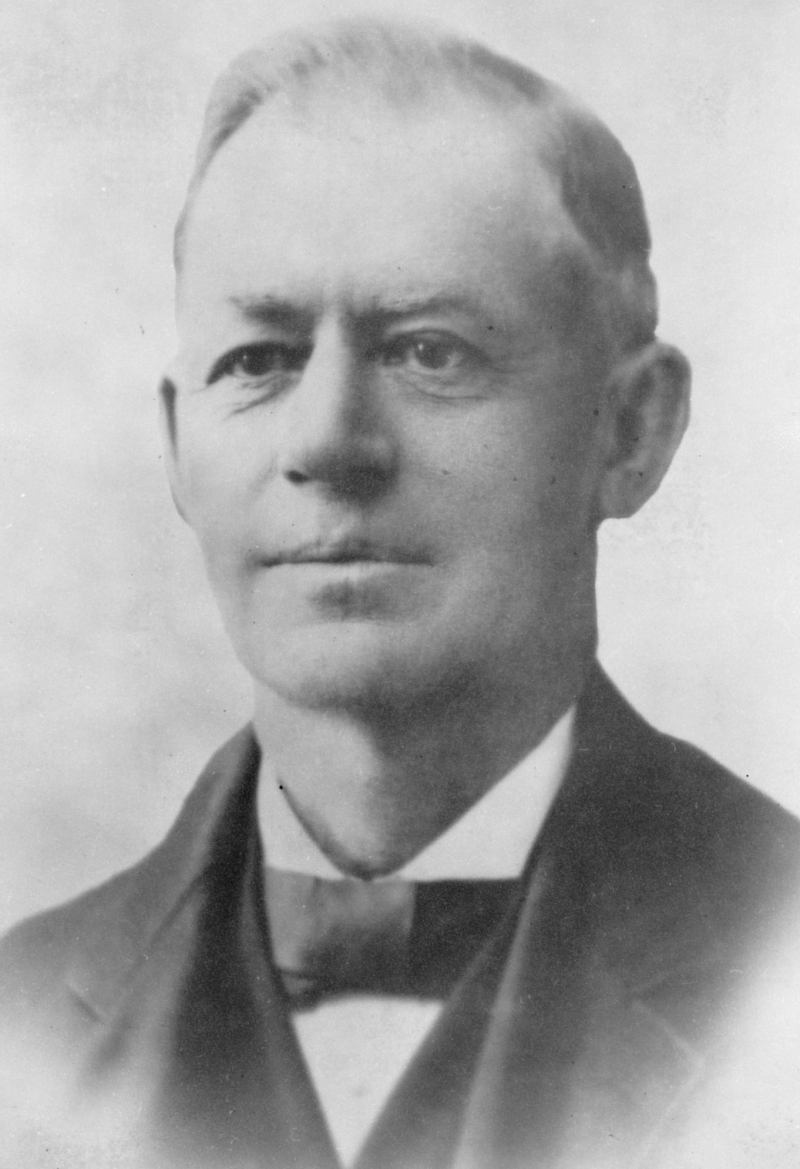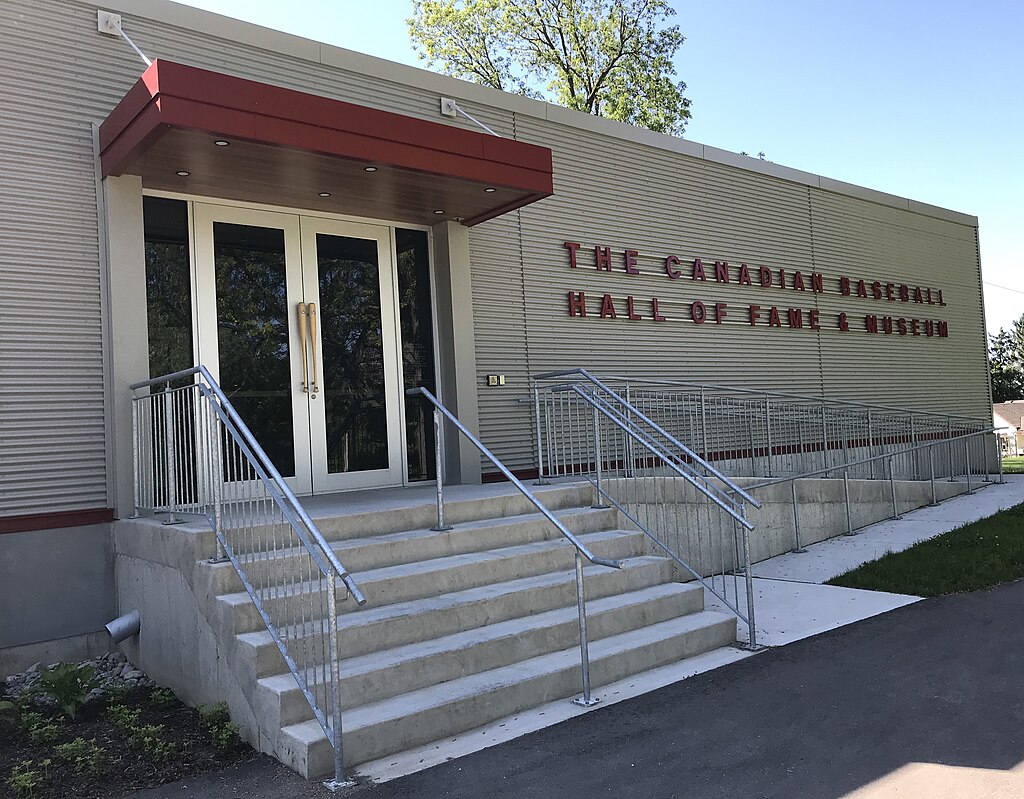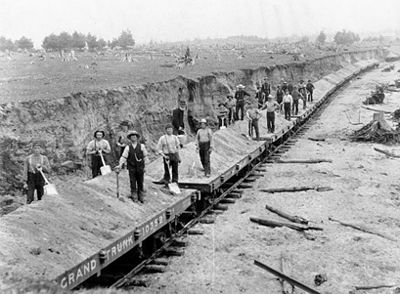George Sleeman, brewer, businessman, politician, Canadian baseball pioneer (born 1 August 1841 in St. Davids, Canada West; died 16 December 1926 in Guelph, ON.) Sleeman was born into a family whose involvement in the brewing industry began in Cornwall, England. The Silver Creek Brewery, which the Sleeman family established in Guelph in 1851, was the forerunner of Sleeman Breweries. Sleeman was prominently involved in Guelph’s business and social interests, including the building of the city’s street railway system and serving as the city’s first mayor (see Transportation; Municipal Government). As the president and chief financial backer of the Guelph Maple Leafs baseball team, Sleeman also played a notable role in the development of baseball in Canada.

Early Life and Education
George Sleeman was the fourth child of John and Ann Sleeman, who had immigrated from England to Canada in either 1834 or 1836 (see Immigration to Canada). John Sleeman was a brewer and worked at his trade in several communities in Canada West and New York before finally settling in Guelph in 1847 (see Brewing Industry in Canada).
George attended school in St. Davids and Guelph. There is no record of him attending any secondary or post-secondary educational institution. Allegedly, he was privately tutored by a teacher in Guelph. George grew up in the brewing business and learned the trade from his father.
Family Beer Business
In 1851, John Sleeman established the Silver Creek Brewery in Guelph (see Brewing Industry in Canada). Guelph was favourably situated for the establishment of a brewery due to the quality of the local spring water, the availability of locally cultivated barley and hops, a growing population and the town’s location as a transportation centre. In 1859, 18-year-old George Sleeman was brought into his father’s company as business manager after the elder Sleeman had experienced financial difficulties. In 1865, George Sleeman became a full partner. Under his innovative management, facilities were updated and production increased. Following his father’s retirement in 1867, Sleeman added to Silver Creek’s product line and surpassed local competitors in production and sales of ale, lager and porter. He established branch breweries and bottling plants in other cities, as well as sales agencies. Sleeman also expanded his product market across Ontario and into Quebec. Silver Creek’s beer became known internationally and won medals at exhibitions in Toronto and Chicago. By 1894, Sleeman’s Guelph production alone exceeded 100,000 barrels of ale and porter annually.

Did you know?
George Sleeman served as president of the Brewers and Malsters Association of Ontario from 1898 to 1902.
Sleeman became wealthy and influential with the success of the Silver Creek Brewery and he expanded into other business enterprises. Among his numerous business investments in Guelph were the Wellington Hotel and the Royal Opera House. To challenge the local monopoly of the Grand Trunk Railway, Sleeman also invested in the Guelph Junction Railway and became one of its directors.
Baseball and the Guelph Maple Leafs
By the age of 20, George Sleeman was playing baseball, a game that had been growing increasingly popular in Ontario. He also saw it as a means of promoting his brewery’s product and attracting new businesses to Guelph. In 1872, he formed a team of employees called the Silver Creeks, with himself as manager and one of the pitchers. To strengthen the Silver Creeks, Sleeman hired talented local amateur players to work at the brewery so that they could play for the team. The Silver Creeks were so successful, that in 1874 Sleeman was invited to become president of the semi-professional Guelph Maple Leafs. In Canada, this marked the beginning of organized baseball being managed by members of a business class.

Sleeman was one of the first Canadian baseball team presidents to recruit professional American players. The Guelph Maple Leafs became an elite team, attracting large crowds to exhibition games with highly rated clubs like the Boston Red Stockings, earning Guelph the sobriquet “The Hometown of Baseball in Canada.” In 1874, Sleeman’s Guelph Maple Leafs won the World Semi-Professional Tournament in Watertown, New York, defeating highly favoured American competition. That year Guelph also won the Canadian baseball championship, a title they successfully defended in 1875, but lost in 1876. On 7 April 1876, Sleeman was made president of the newly formed Canadian Association of Baseball Players.
In 1881, Sleeman became the first Canadian baseball team president to invite a Black player to join an otherwise all-white team when he asked pitcher Bud Fowler (John W. Jackson) to play for the Guelph Maple Leafs. Fowler arrived in Guelph but did not have an opportunity to pitch for the Maple Leafs due to racist attitudes among some of the other players.
Sleeman retired as president of the Guelph Maple Leafs in 1886.
Politics
In 1876, George Sleeman was elected to the Guelph Town Council. This was followed by service as reeve, and then as chairman of the Inauguration Committee when Guelph was incorporated as a city in 1879.
In 1880, Sleeman was elected by acclamation as the first mayor of the City of Guelph, a position that he held until 1882. He was elected again in 1892 to complete the term of the late mayor Thomas Goldie. Sleeman was elected again as mayor for the 1905-06 term. (See also Municipal Government in Canada.)
Financial Troubles
In 1895, George Sleeman built the electrically powered Guelph Railway Company. The company was entirely owned and operated by the Sleeman family. Initially it was profitable and Sleeman expanded the lines. However, by 1903 it was losing money and went into receivership. Banks seized the street railway company and control of Silver Creek Brewery. Sleeman founded Sleeman & Sons in partnership with his wife, Sarah (née Hill), and three of their sons and built the Spring Bank Brewery. Despite having retired from the industry in 1905, Sleeman purchased his old brewery back from the bank in 1906 and consolidated his business operations under the name Sleeman Brewing and Malting Co.

Later Years and Death
The Ontario Temperance Act of 1916 was passed, in spite of opposition from George Sleeman and other brewers and distillers (see Temperance Movement in Canada). Because of loss of business due to prohibition, Sleeman Brewing and Malting ceased brewing operations in July 1916. Spring Bank remained in operation, selling soft drinks. Sleeman Brewing and Malting did not brew beer again until 1927, when prohibition was repealed. The same year the Silver Creek Brewery was sold to the Bank of Montreal to pay debts. In December of 1926, Sleeman was hospitalized with an internal problem. He underwent abdominal surgery from which he did not recover.
Legacy
In 1933, the sons of George Sleeman were charged with smuggling alcohol into the United States and failing to pay taxes. The family’s brewing licence was suspended for 50 years, but in 1988, George Sleeman’s great-grandson John W. Sleeman incorporated Sleeman Brewing and Malting Co. Ltd. In 1994, the company was renamed Sleeman Breweries Ltd. and in 2006 purchased by Sapporo. As of 2023, Sleeman Breweries is the third-largest brewing company in Canada, with breweries in Guelph, Chambly, Vernon and Calgary.
Honours and Awards
- Inductee, Canadian Baseball Hall of Fame and Museum (1999)

 Share on Facebook
Share on Facebook Share on X
Share on X Share by Email
Share by Email Share on Google Classroom
Share on Google Classroom













